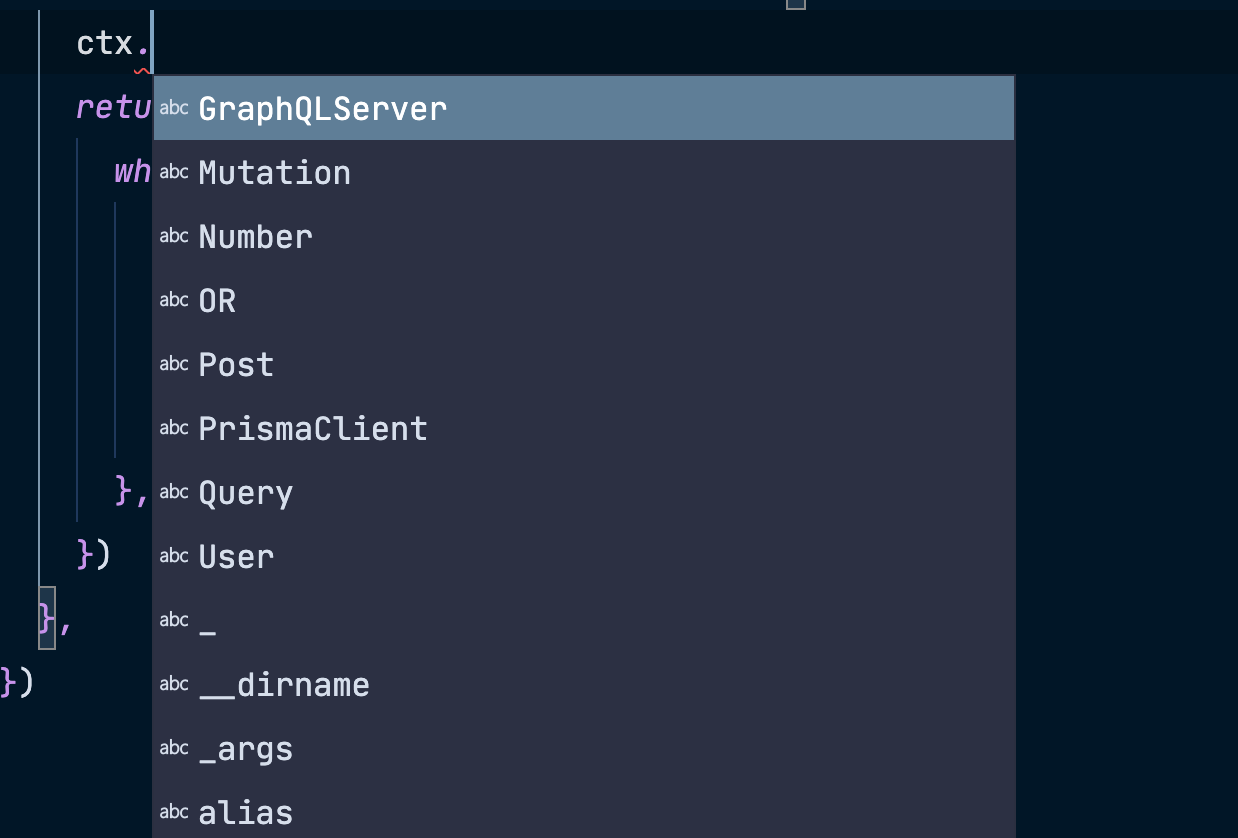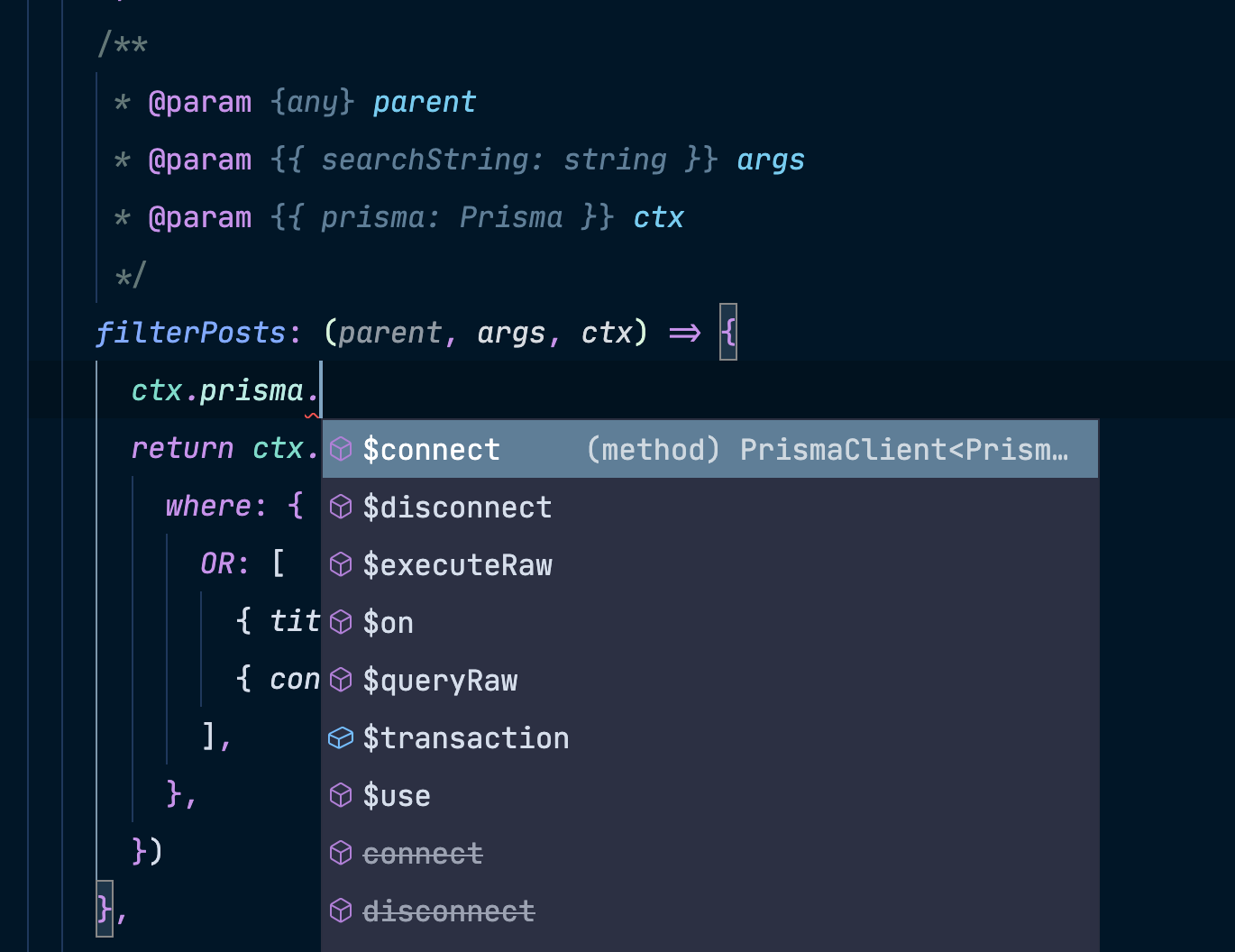Autocompletion in GraphQL resolvers with JavaScript
Problem
When using GraphQL with TypeScript, you always get autocompletion for the Prisma Client instance in your GraphQL resolvers because then the context object can be typed – no matter if folks are using Nexus, TypeGraphQL or SDL first. This immensely helps with autocompletion and preventing unwanted errors.
Unfortunately, this needs a little more effort when you're working in plain JavaScript. Suppose we have a resolver like this:
filterPosts: (parent, args, ctx) => {
return ctx.prisma.post.findMany({
where: {
OR: [
{ title: { contains: args.searchString } },
{ content: { contains: args.searchString } },
],
},
})
}
Now whenever you type ctx. VS Code will provide unnecessary options in the autocomplete which is undesirable.

VS Code doesn't know the type of the context object so it can't provide any intellisense for it, which is why unwanted suggestions are displayed.
Solution
To overcome this, you need to add a JSDoc comment named typedef to "import" the correct type of your PrismaClient instance.
// Add this to the top of the file
/**
* @typedef { import("@prisma/client").PrismaClient } Prisma
*/
Note: You can learn more about JSDoc here.
Finally, you need to type your resolver arguments. For simplicity, ignore the parent and args parameters. So the resolver should now look like this:
/**
* @param {any} parent
* @param {{ searchString: string }} args
* @param {{ prisma: Prisma }} ctx
*/
filterPosts: (parent, args, ctx) => {
return ctx.prisma.post.findMany({
where: {
OR: [
{ title: { contains: args.searchString } },
{ content: { contains: args.searchString } },
],
},
})
}
This will tell VS Code that the context has a property named prisma and the type is Prisma which was defined in the @typedef above.
And voilà, autocompletion in plain JavaScript.

The final file should look something like:
/**
* @typedef { import("@prisma/client").PrismaClient } Prisma
* @typedef { import("@prisma/client").UserCreateArgs } UserCreateArgs
*/
const { makeExecutableSchema } = require('graphql-tools')
const typeDefs = `
type User {
email: String!
id: ID!
name: String
posts: [Post!]!
}
type Post {
author: User
content: String
id: ID!
published: Boolean!
title: String!
}
type Query {
feed: [Post!]!
filterPosts(searchString: String): [Post!]!
post(where: PostWhereUniqueInput!): Post
}
type Mutation {
createDraft(authorEmail: String, content: String, title: String!): Post!
deleteOnePost(where: PostWhereUniqueInput!): Post
publish(id: ID): Post
signupUser(data: UserCreateInput!): User!
}
input PostWhereUniqueInput {
id: ID
}
input UserCreateInput {
email: String!
id: ID
name: String
posts: PostCreateManyWithoutPostsInput
}
input PostCreateManyWithoutPostsInput {
connect: [PostWhereUniqueInput!]
create: [PostCreateWithoutAuthorInput!]
}
input PostCreateWithoutAuthorInput {
content: String
id: ID
published: Boolean
title: String!
}
`
const resolvers = {
Query: {
/**
* @param {any} parent
* @param {any} args
* @param {{ prisma: Prisma }} ctx
*/
feed: (parent, args, ctx) => {
return ctx.prisma.post.findMany({
where: { published: true },
})
},
/**
* @param {any} parent
* @param {{ searchString: string }} args
* @param {{ prisma: Prisma }} ctx
*/
filterPosts: (parent, args, ctx) => {
return ctx.prisma.post.findMany({
where: {
OR: [
{ title: { contains: args.searchString } },
{ content: { contains: args.searchString } },
],
},
})
},
/**
* @param {any} parent
* @param {{ where: { id: string }}} args
* @param {{ prisma: Prisma }} ctx
*/
post: (parent, args, ctx) => {
return ctx.prisma.post.findUnique({
where: { id: Number(args.where.id) },
})
},
},
Mutation: {
/**
* @param {any} parent
* @param {{ title: string, content: string, authorEmail: (string|undefined) }} args
* @param {{ prisma: Prisma }} ctx
*/
createDraft: (parent, args, ctx) => {
return ctx.prisma.post.create({
data: {
title: args.title,
content: args.content,
published: false,
author: args.authorEmail && {
connect: { email: args.authorEmail },
},
},
})
},
/**
* @param {any} parent
* @param {{ where: { id: string }}} args
* @param {{ prisma: Prisma }} ctx
*/
deleteOnePost: (parent, args, ctx) => {
return ctx.prisma.post.delete({
where: { id: Number(args.where.id) },
})
},
/**
* @param {any} parent
* @param {{ id: string }} args
* @param {{ prisma: Prisma }} ctx
*/
publish: (parent, args, ctx) => {
return ctx.prisma.post.update({
where: { id: Number(args.id) },
data: { published: true },
})
},
/**
* @param {any} parent
* @param {UserCreateArgs} args
* @param {{ prisma: Prisma }} ctx
*/
signupUser: (parent, args, ctx) => {
return ctx.prisma.user.create(args)
},
},
User: {
/**
* @param {{ id: number }} parent
* @param {any} args
* @param {{ prisma: Prisma }} ctx
*/
posts: (parent, args, ctx) => {
return ctx.prisma.user
.findUnique({
where: { id: parent.id },
})
.posts()
},
},
Post: {
/**
* @param {{ id: number }} parent
* @param {any} args
* @param {{ prisma: Prisma }} ctx
*/
author: (parent, args, ctx) => {
return ctx.prisma.post
.findUnique({
where: { id: parent.id },
})
.author()
},
},
}
const schema = makeExecutableSchema({
resolvers,
typeDefs,
})
module.exports = {
schema,
}